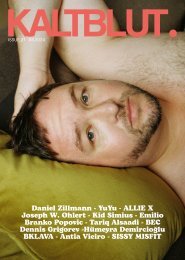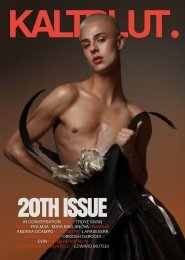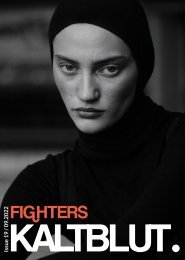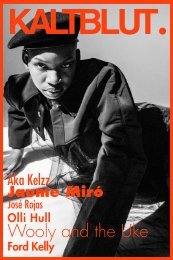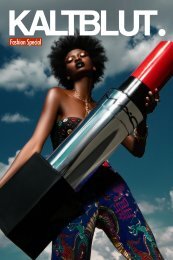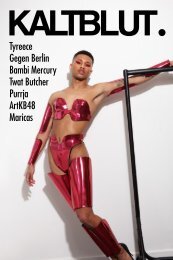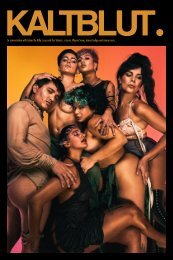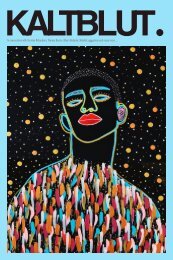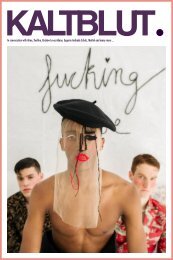In conversation with .. 5!
#PrideIssue - Welcome to our new digital issue: IN CONVERSATION WITH – Part 5, 144 pages fashion, art and illustrations! Out 17.07.2020 – featuring in conversation with Pabllo Vittar, Adrien Weiss, Ella Boucht, Davi, Phoebe Bridgers, Mateo Velasquez, Lil Botox. Featuring Crystal from RuPaul’s Drag Race UK Season 1, Tom of Finland, Darren Skene, Pablo Solano, Damian Garcia, Sammy Finn Cullis, Jacopo Marchio, Ernst van Hoek and more. On the cover, Chris Flora photographed by Alberto Lanz.
#PrideIssue - Welcome to our new digital issue: IN CONVERSATION WITH – Part 5, 144 pages fashion, art and illustrations! Out 17.07.2020 – featuring in conversation with Pabllo Vittar, Adrien Weiss, Ella Boucht, Davi, Phoebe Bridgers, Mateo Velasquez, Lil Botox. Featuring Crystal from RuPaul’s Drag Race UK Season 1, Tom of Finland, Darren Skene, Pablo Solano, Damian Garcia, Sammy Finn Cullis, Jacopo Marchio, Ernst van Hoek and more. On the cover, Chris Flora photographed by Alberto Lanz.
Create successful ePaper yourself
Turn your PDF publications into a flip-book with our unique Google optimized e-Paper software.
Even when you talk about the lack of photography<br />
when we think of the masculine female, it conjures up<br />
imagery by Helmut Newton which again is from the<br />
male gaze.<br />
When I was doing my research at the CSM library, there<br />
were only four books focused on lesbian women or made<br />
by lesbian women. You really have to start digging deeper<br />
and go through archives or online because obviously there<br />
was a time where it was dangerous to be out in society. A<br />
lot of the lesbian context was hidden or got destroyed or<br />
letters where they took away the names so you wouldn’t<br />
know who it<br />
was written<br />
from. <strong>In</strong> some<br />
communities,<br />
they didn’t<br />
even want to be<br />
out, like in the<br />
documentary<br />
Shakedown (by<br />
Leilah Weinraub)<br />
about this lesbian<br />
strip club in<br />
America where<br />
they talk about<br />
not wanting to<br />
be in editorials<br />
or articles<br />
because it’s<br />
for them. They<br />
don’t care about<br />
visibility because<br />
they have their<br />
visibility <strong>with</strong><br />
their people<br />
on the inside.<br />
There’s a side<br />
where our<br />
history has been<br />
erased and then<br />
there is a part<br />
wanting to keep<br />
it for us.<br />
Gender labels<br />
feel like it<br />
should be<br />
an outdated<br />
concept, but at<br />
the same time,<br />
you just spoke<br />
removing names<br />
from letters and parts of history, have you yourself been<br />
censored?<br />
I’ve been censored when trying to upload, especially<br />
imagery of female bodies overall. It went as far as<br />
<strong>In</strong>stagram taking away my whole account and said it was<br />
permanently deleted and I wasn’t going to get it back, but<br />
after a fight and an article, we managed to get it back. I<br />
use <strong>In</strong>stagram as such a big tool, not just for marketing,<br />
but also how I find collaborators and other companies<br />
to work <strong>with</strong>. I could also say that I censor myself in a<br />
way, since being a kid, because I haven’t had the courage<br />
or possibility to be out in the way that I wanted to. I was<br />
afraid of not being enough and not enough for the queer<br />
community. Censorship is everywhere. I feel that the<br />
terms should be used in a fluid way, where one can swap<br />
around and not be endangered if you want to change from<br />
a butch to a femme more or the other way. It should be<br />
more accepting to experiment <strong>with</strong> your identity. It’s a war<br />
inside and a learning curve.<br />
Just as women, in the female community, in the past<br />
few months <strong>with</strong> Black Lives Matter, I’ve been thinking<br />
about how<br />
much black<br />
women have<br />
been excluded<br />
from our female<br />
community.<br />
Especially when<br />
it comes to white<br />
feminism, we<br />
have excluded a<br />
huge part of our<br />
community and<br />
the same when<br />
it comes to most<br />
of the lesbian<br />
photography that<br />
I found, it’s mostly<br />
white. Racism is<br />
there as well as<br />
it’s been erased<br />
from the lesbian<br />
history too. One<br />
of the things that<br />
people don’t know<br />
is that a lot has<br />
came from the<br />
black community<br />
as well. Just today<br />
I was talking to<br />
my friend about<br />
the word “dyke”,<br />
it’s a word that<br />
many of us have<br />
been using. It<br />
comes from the<br />
black community<br />
where people<br />
have been called<br />
the “bulldyke”.<br />
Now a lot of black<br />
lesbians are trying<br />
to take back their pride as well because we as white people<br />
been taken away from where it comes from <strong>with</strong>out having<br />
even understood the history of where it stems from. We<br />
have to learn, educate ourselves and be more aware.<br />
What is butch for you?<br />
For me, it’s about empowerment, a strong identity where<br />
you feel very comfortable in where you are and how you<br />
walk through life. You wear <strong>with</strong> pride. It connects the<br />
inside and the outside in a way, body and soul. Butch is so<br />
varied and so many beautiful people under the umbrella.<br />
13




